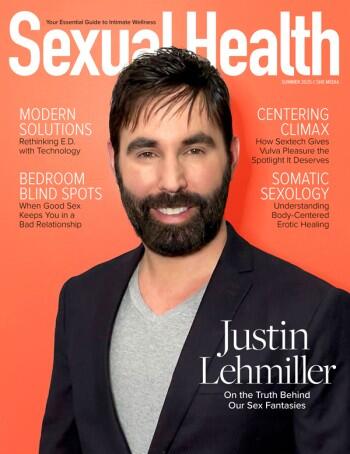Sexual experience and pleasure are fundamental human rights, and it should be the industry’s mission to bring those human rights to those who are traditionally excluded not just from the physical act of masturbation, but from the conversation itself.
It’s this conversation where businesses — both in the sex-toy industry and otherwise — can really lead the way. When we exclude people with disabilities from marketing, advertising and conversations, it may not seem to have far-reaching consequences, but it does, not just to people with disabilities, but to business as well.
The more we open up conversations, using marketing and advertising as our tool, the more we can ensure people with disabilities become a completely expected part of mainstream society.
The Daily Grind
Just as living with disabilities when you have a supportive family or partner is a very different life from having no support, the ability to earn a reasonable income can also make a huge difference in the lives of people with disabilities. A person with a disability trying to get a job often faces extreme prejudice. According to Hot Octopuss’s Disability Lead Kelly Gordon, “We’re seen as unreliable, or we need too much flexibility, or we lack the manual skills to do every part of the job. People assume it would be easier to hire an able-bodied person.” But the less that disabled people are working in mainstream places, the less likely they are to become part of any conversation — much less a conversation about sex — and the less likely able-bodied people are to develop any kind of understanding of an experience that’s different from their own.
Then there’s the isolation. A large number of disabled people who are unable to be fully independent can still end up living alone, unable to socialize due to lack of care assistance. They may unable to progress into a career, face limitations on earnings and sometimes, in the worst situations, can be forced by the government into nursing homes. Add in limited mobility or strength, and the idea of exploring your sexuality becomes an impossible dream.
Forget about casual sex and one-night stands if you’re physically disabled. “It’s a dangerous game,” Gordon said. “Let’s say you meet someone on a night out in a club or a bar, how are you going to get back to their place? Houses can often be inaccessible. Potential partners have told me that they’d carry me into their homes, but then that leaves me stranded on their bed or sofa without my wheelchair; and that means that I am instilling my trust into them completely. And once you’re there, you’re vulnerable in a stranger’s house. But if you invite them back to yours, then you’ve let a stranger know exactly where you — a vulnerable person — live.” None of which leaves a lot of room for sexual experimentation, or a fulfilling sex life. "Hotel rooms can be even worse! People are often keen to get you onto a bed, but who says they’ll help you get back off it and into your wheelchair when you are ready to leave?"
Normalize, Don’t Fetishize
Online dating — a lifesaver, right? Not always. In fact, if you’re disabled, it can be an exercise in humiliation and pure ignorance. Gordon firmly believes that the way we’re used to seeing disabled people in the mainstream media, marketing or in entertainment has had a huge effect on her dating life.
“Able-bodied people — in my experience — don’t understand that we have the exact same sexual urges and needs as they do,” she said. “They certainly don’t think we use sex aids or toys for fun. They’ve probably never seen an image of a disabled person holding a sex toy, or a show on TV where a disabled person is sexually active. There’s so little marketing that features disability [so there’s nothing that can] shine a light upon it.”
It is really important that those of us in a position to do so ensure that our marketing and imagery is inclusive of everyone who uses our products.
A Wider Societal Impact
The more we open up conversations, using marketing and advertising as our tool, the more we can ensure people with disabilities become a completely accepted part of mainstream society — whether or not we’re talking about sex. But talking about sex, the more we include disability, the easier it is for interabled couples to have the often-awkward conversations that come up. From dealing with chronic pain, to lifting, positioning, continued consent, and understanding pain barriers, there’s a lot to discuss.
Gordon says, “Right now, it takes either an open-minded or very thoughtful person to start the conversation around disability and sex, and how exactly it is going to take place. If we could bring our sexuality into the mainstream, it would make life easier for us, and [also make] able-bodied people feel more comfortable to approach these subjects too.”
A More Accessible Future
We’re a long way from living in a world where we see a wheelchair-user in a marketing campaign about sex, where the focus is not directly on their disability. Through listening to our community, we learned that sex toys should be adaptable to be accessible as standard — not specially made. But we also have a lot to learn. So, how will we know when what we’re doing is working? According to Gordon, there’s no better place to look than the silver screen.
“When a disabled actor can read a casting sheet for the romantic lead in a mainstream show, and it says: ‘Lead actor: Any ability,’ then I’ll know we’re making progress,” she said.
Why Should You Care?
Simply put, the more inclusive you become as a brand, the more customers you’ll have. In the sex toy industry, the more accessible your toys are, the more customers you’ll have, and the simplest way to get more customers is to tap into a market you’re not yet serving. Remember that disability is far more widespread than one might think — many disabilities aren’t visible or obvious but significantly impact people in their sex lives.
The hope is that if you make the change and start regularly featuring able-bodied and disabled models together in sex-toy marketing, with more mainstream exposure, people like Gordon won’t have to put up with constant fetishization or being told, “You’re too pretty for that wheelchair,” or the regular assumption that a person with disabilities should be grateful just to be considered. As for your bottom line, it’s a no-brainer: the more people are having sex, the more people are buying toys — and hopefully using them so much, they’ll need to buy another (and maybe recommend it to a friend).
Julia Margo is the co-founder and COO of revolutionary sex toy company Hot Octopuss who in 2013 created the world’s first “Guybrator.”







